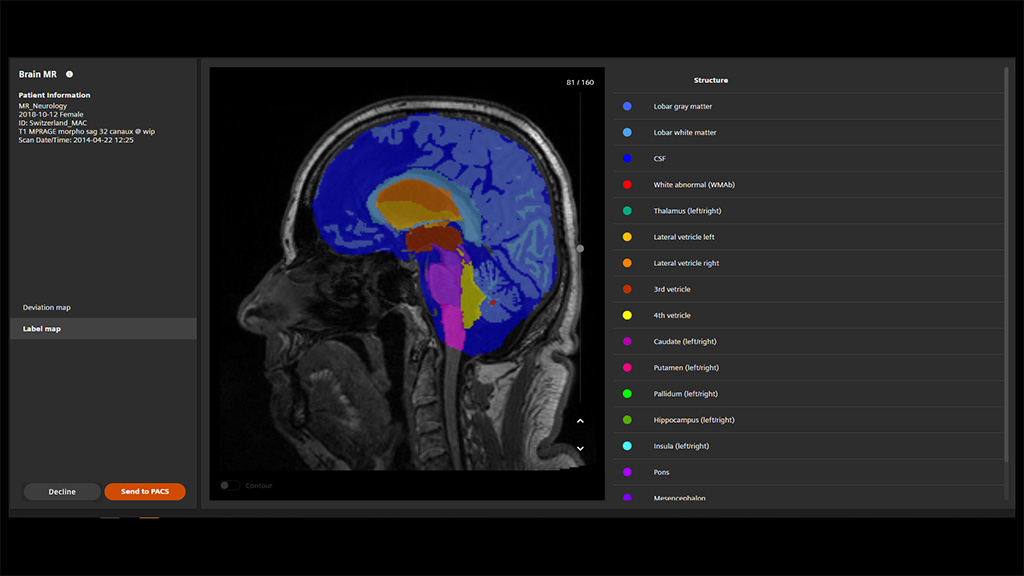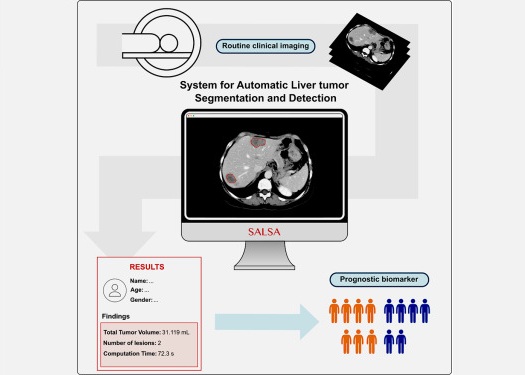AI-Based Assistants Smooth MRI Workflow
|
By MedImaging International staff writers Posted on 31 Dec 2019 |

Image: The AI-Rad Companion Brain MR for Morphometry Analysis (Photo courtesy of Siemens Healthineers)
Two new software assistants based on artificial intelligence (AI) free radiologists from the burden of performing routine activities during magnetic resonance imaging (MRI) examinations.
The new AI-Rad Companion apps, intended for use during brain and prostate MRI scans, are designed by Siemens Healthineers (Erlangen, Germany), but can be used on devices from different manufacturers. The software apps seamlessly integrate into the existing clinical workflow and comply with Digital Imaging and Communications in Medicine (DICOM) standards. Clinical images and all supporting information are automatically available in the picture archiving and communication system (PACS), depending on the radiologists’ requirements.
The AI-Rad Companion Brain MR for Morphometry Analysis can automatically identify about 50 brain segments on MRI images, measure their volumes, and compare the results to data in a normative reference database for brain morphometry made available by the Alzheimer’s Disease Neuroimaging Initiative (ADNI). The results are fed into a report where deviations from the norm are automatically marked. Radiologists can thus provide the neurology department with objective, quantitative data relevant to differential diagnosis and therapy management.
The AI-Rad Companion Prostate MR for Biopsy Support automatically segments the outer contour of the prostate, which can cut the time needed for this routine activity down to just a few seconds. The radiologist then simply marks the suspect areas and hands the annotated MRI images to the urologist for fusion with the ultrasound images during the biopsy. The targeted, MRI-supported biopsies can make it easier for the urologist to detect significant prostate carcinomas and improve the quality of patient care.
“With the new AI-based assistants, we are expanding our diagnostic offering to help our customers increase efficiency and improve the quality of care. We firmly believe that AI will help physicians deal with their workload and benefit patients by helping achieve an improved, patient-focused decision-making process,” said Peter Koerte, head of digital health at Siemens Healthineers. “Further applications for radiography and radio oncology will follow for the AI-Rad Companion family.”
Related Links:
Siemens Healthineers
The new AI-Rad Companion apps, intended for use during brain and prostate MRI scans, are designed by Siemens Healthineers (Erlangen, Germany), but can be used on devices from different manufacturers. The software apps seamlessly integrate into the existing clinical workflow and comply with Digital Imaging and Communications in Medicine (DICOM) standards. Clinical images and all supporting information are automatically available in the picture archiving and communication system (PACS), depending on the radiologists’ requirements.
The AI-Rad Companion Brain MR for Morphometry Analysis can automatically identify about 50 brain segments on MRI images, measure their volumes, and compare the results to data in a normative reference database for brain morphometry made available by the Alzheimer’s Disease Neuroimaging Initiative (ADNI). The results are fed into a report where deviations from the norm are automatically marked. Radiologists can thus provide the neurology department with objective, quantitative data relevant to differential diagnosis and therapy management.
The AI-Rad Companion Prostate MR for Biopsy Support automatically segments the outer contour of the prostate, which can cut the time needed for this routine activity down to just a few seconds. The radiologist then simply marks the suspect areas and hands the annotated MRI images to the urologist for fusion with the ultrasound images during the biopsy. The targeted, MRI-supported biopsies can make it easier for the urologist to detect significant prostate carcinomas and improve the quality of patient care.
“With the new AI-based assistants, we are expanding our diagnostic offering to help our customers increase efficiency and improve the quality of care. We firmly believe that AI will help physicians deal with their workload and benefit patients by helping achieve an improved, patient-focused decision-making process,” said Peter Koerte, head of digital health at Siemens Healthineers. “Further applications for radiography and radio oncology will follow for the AI-Rad Companion family.”
Related Links:
Siemens Healthineers
Latest MRI News
- Cutting-Edge MRI Technology to Revolutionize Diagnosis of Common Heart Problem
- New MRI Technique Reveals True Heart Age to Prevent Attacks and Strokes
- AI Tool Predicts Relapse of Pediatric Brain Cancer from Brain MRI Scans
- AI Tool Tracks Effectiveness of Multiple Sclerosis Treatments Using Brain MRI Scans
- Ultra-Powerful MRI Scans Enable Life-Changing Surgery in Treatment-Resistant Epileptic Patients
- AI-Powered MRI Technology Improves Parkinson’s Diagnoses
- Biparametric MRI Combined with AI Enhances Detection of Clinically Significant Prostate Cancer
- First-Of-Its-Kind AI-Driven Brain Imaging Platform to Better Guide Stroke Treatment Options
- New Model Improves Comparison of MRIs Taken at Different Institutions
- Groundbreaking New Scanner Sees 'Previously Undetectable' Cancer Spread
- First-Of-Its-Kind Tool Analyzes MRI Scans to Measure Brain Aging
- AI-Enhanced MRI Images Make Cancerous Breast Tissue Glow
- AI Model Automatically Segments MRI Images
- New Research Supports Routine Brain MRI Screening in Asymptomatic Late-Stage Breast Cancer Patients
- Revolutionary Portable Device Performs Rapid MRI-Based Stroke Imaging at Patient's Bedside
- AI Predicts After-Effects of Brain Tumor Surgery from MRI Scans
Channels
Radiography
view channel
AI Improves Early Detection of Interval Breast Cancers
Interval breast cancers, which occur between routine screenings, are easier to treat when detected earlier. Early detection can reduce the need for aggressive treatments and improve the chances of better outcomes.... Read more
World's Largest Class Single Crystal Diamond Radiation Detector Opens New Possibilities for Diagnostic Imaging
Diamonds possess ideal physical properties for radiation detection, such as exceptional thermal and chemical stability along with a quick response time. Made of carbon with an atomic number of six, diamonds... Read moreUltrasound
view channel.jpeg)
AI-Powered Lung Ultrasound Outperforms Human Experts in Tuberculosis Diagnosis
Despite global declines in tuberculosis (TB) rates in previous years, the incidence of TB rose by 4.6% from 2020 to 2023. Early screening and rapid diagnosis are essential elements of the World Health... Read more
AI Identifies Heart Valve Disease from Common Imaging Test
Tricuspid regurgitation is a condition where the heart's tricuspid valve does not close completely during contraction, leading to backward blood flow, which can result in heart failure. A new artificial... Read moreNuclear Medicine
view channel
Novel Radiolabeled Antibody Improves Diagnosis and Treatment of Solid Tumors
Interleukin-13 receptor α-2 (IL13Rα2) is a cell surface receptor commonly found in solid tumors such as glioblastoma, melanoma, and breast cancer. It is minimally expressed in normal tissues, making it... Read more
Novel PET Imaging Approach Offers Never-Before-Seen View of Neuroinflammation
COX-2, an enzyme that plays a key role in brain inflammation, can be significantly upregulated by inflammatory stimuli and neuroexcitation. Researchers suggest that COX-2 density in the brain could serve... Read moreGeneral/Advanced Imaging
view channel
CT-Based Deep Learning-Driven Tool to Enhance Liver Cancer Diagnosis
Medical imaging, such as computed tomography (CT) scans, plays a crucial role in oncology, offering essential data for cancer detection, treatment planning, and monitoring of response to therapies.... Read more
AI-Powered Imaging System Improves Lung Cancer Diagnosis
Given the need to detect lung cancer at earlier stages, there is an increasing need for a definitive diagnostic pathway for patients with suspicious pulmonary nodules. However, obtaining tissue samples... Read moreImaging IT
view channel
New Google Cloud Medical Imaging Suite Makes Imaging Healthcare Data More Accessible
Medical imaging is a critical tool used to diagnose patients, and there are billions of medical images scanned globally each year. Imaging data accounts for about 90% of all healthcare data1 and, until... Read more
Global AI in Medical Diagnostics Market to Be Driven by Demand for Image Recognition in Radiology
The global artificial intelligence (AI) in medical diagnostics market is expanding with early disease detection being one of its key applications and image recognition becoming a compelling consumer proposition... Read moreIndustry News
view channel
GE HealthCare and NVIDIA Collaboration to Reimagine Diagnostic Imaging
GE HealthCare (Chicago, IL, USA) has entered into a collaboration with NVIDIA (Santa Clara, CA, USA), expanding the existing relationship between the two companies to focus on pioneering innovation in... Read more
Patient-Specific 3D-Printed Phantoms Transform CT Imaging
New research has highlighted how anatomically precise, patient-specific 3D-printed phantoms are proving to be scalable, cost-effective, and efficient tools in the development of new CT scan algorithms... Read more
Siemens and Sectra Collaborate on Enhancing Radiology Workflows
Siemens Healthineers (Forchheim, Germany) and Sectra (Linköping, Sweden) have entered into a collaboration aimed at enhancing radiologists' diagnostic capabilities and, in turn, improving patient care... Read more





















